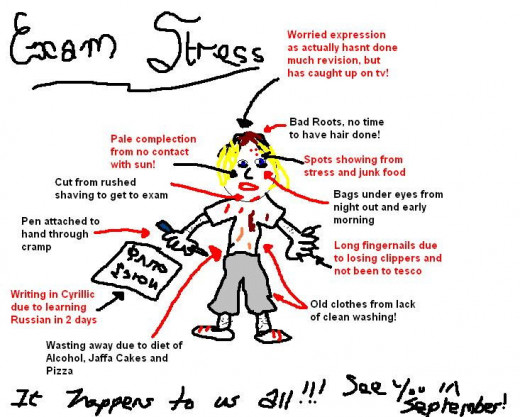5 Tips on How to Study for College-Level Exams
Overwhlemed by Exams?

5 Steps to Pass College Exams
Over the course of my academic life, I have taken many school related tests and exams. Through the course of completing a Bachelor of Arts, MBA, and recently a Ph.D., I learned some techniques for studying for college exams. For my personal expereince, I observed that college students are faced with one or two midterm exams and one large final exam for each course in their schedule. Most college students take between 3 to 5 courses per semester which can add up to a lot of test taking, even though not all courses require written exams. Adding in the average students social life, college attendees are often cramming for their exams at the last minute. In light of this reality and my experience, this article discusses how to study with only a week until exams.
Go to All Class Sessions, Take All the Notes, Read All Assigned Reading
The first step to pass college exams is (a) read all assigned reading; (b) go to all class sessions; and (c) take all class notes. This may be regarded as a preliminary step to the topic title and yet it is difficult to study for an exam if you do not have all the relevant information. Get a head start by participating in all course sessions and doing all the assigned work.
Cannot Cram Any More In?

Write an Outline of Each Course Topic
The second step to how to study with only a week until exams is to take the assigned books and course notes in hand and script out outlines of topic highlighted by your professor or assigned books. First, make a list of all essential points. Next, outline each essential point by breaking them down to their main subpoints.
For instance, let's say the exam will be on the causes of the Civil War. Write out all the essential points covered by the professor and assigned books concerning the causes of the Civil War. Then, outline the points into main points and subpoints.
Script Out Full Paragraphs
The third step is to convert your outlines to full paragraphs. Write out a college level answer to the main points covered by your college professor in the course curriculum. This exercise will help you get a good overview of the subject matter. Simply air it out. Script out each essential idea or event pertaining to the college course subject matter. Try to be as thorough and accurate as you can.
Reduce Each Point to a Sentence
The fourth step is to reduce each idea or event to one or two coherent sentences. This step may seem redundant as it closely matches step two. Yet, this step allows the college student to get the main ideas stuck in your brain. Each time you handle the information and the more you can clarify points in short lines, the more apt you will be to remember the point during the college exam. I used this method and I had top tier results in my last three degree programs.
For instance, one sentence related to the causes of the Civil War might read:
One cause of the Civil War was the economic disparity between the States in the North and the South. The end of slavery would cause hardship in the South because the Southern plantations were dependent on the no cost labor slaves provided by the slaves.
Reduce Each Sentence to Three to Five Key Terms
The fifth step is to reduce each sentence to three to five key words or terms. This step allows you one more opportunity to handle the information and to cement the information in your brain. Write the three to five key terms on a quick reference study sheet. Then, the night before or the morning of the exam, rewrite them repeatedly as fast as you in can attempting to be as accurate as possible.
For instance, as related to the example sentences written above in step four, you could write:
Economic disparity between the North and South
or redue the idea even further to:
Economic disparity
Conclusion
This hub discussed how to study with only one week until exams. In this article the author outlined five steps to study for and pass college exams. The point tip of this hub is to touch the information covered in the course in short meaningful ways that prompt your memory during the exam. College midterm and final exams often coe all at once which leaves little time to cram for exams. The best advice is to do all the required work and attend all required classes and then reduce the ideas and main points to memorable sound bites.






